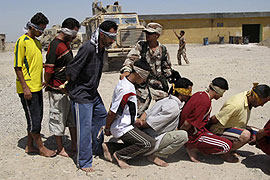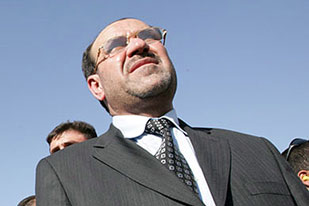Eight US soldiers killed in Iraq
Deaths reported as Maliki says he backs arming of Sunni tribesmen to fight al-Qaeda.

The attack that killed the two soldiers occurred in eastern Baghdad, a predominantly Shia area that has some Sunni enclaves.
Bomb networks
The military said the unit has conducted numerous operations against roadside bomb networks in the past month.
A US soldier also died from a non-battle related cause on Saturday, the military said. The incident was under investigation.
Identities of the soldiers were not released pending notification of relatives.
The deaths raised to at least 3,555 members of the US military have died since the Iraq war started in March 2003, according to an Associated Press count.
Bus ambush
Also on Saturday, a group of armed men stormed a minibus and shot dead six men after dragging them out of the vehicle near the Muslim holy city of Karbala.
 |
| Suspected fighters rounded up during a joint US-Iraqi operation in Baquba [Reuters] |
A local official and a medic said the bus was ambushed in the town of Al-Shikat, west of Karbala, adding that a woman passenger in the bus was released before the men were gunned down.
“The men were dragged out of the bus, while the woman travelling with them was allowed to go. The six men were later shot dead,” said the official, a member of the municipal council of the nearby town of al-Thamur.
He said that one of the victims was Karim Abdul Ridha, a fellow council member.
A medic in the Karbala general hospital confirmed the attack.
Samarra attack
In the northern town of Samarra, armed men attacked a police station and killed two policemen, injured another two policemen and five civilians, a local police officer and a medic said.
One armed man, allegedly an Arab foreign fighter, was killed in the clashes.
In southeastern Baghdad a civilian was killed and five others wounded in a roadside bomb blast, a medic said.
And a former member of executed Saddam Hussein’s Baath party was shot dead in the southern city of Amarra, according to police.
 |
| Al-Maliki said a committee would be established to supervise the arming of Sunni tribesmen [EPA] |
“This must be done under the supervision of the Iraqi authorities and through the government.”
‘Reaching out’
Lieutenant-General Raymond Odierno said: “We have not given weapons to any insurgent groups. They have plenty of weapons.
| “We have not given weapons to any insurgent groups. They have plenty of weapons” Lieutenant-General Raymond Odierno, US military commander |
“I want those weapons to be used against al-Qaeda and not against coalition forces or Iraqi security forces.”
The anti-government Sunni groups, he said, “are reaching out to us, and we are reaching back.
Odierno said US commanders wanted to connect those groups to the Iraqi government within the broader framework of reconciliation.